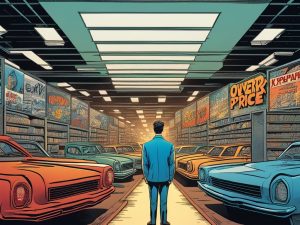Brazil’s CBDC Initiative: Integrating DeFi for a Modern Financial Landscape 🌍💰
This year, Brazil is making significant strides with its Central Bank Digital Currency (CBDC) initiative, known as Drex. The project aims not just to digitize currency, but to transform the country’s financial infrastructure by incorporating decentralized finance (DeFi) elements. This innovative approach is designed to address various financial challenges while enhancing efficiency across the board. As Brazil continues its exploration into these realms, it seeks to establish a multidimensional CBDC capable of offering advanced features beyond traditional digital currency applications.
Key Objectives of the Drex Project 🚀
During a recent presentation on October 3, 2024, Roberto Campos Neto, the President of Banco Central do Brasil, elaborated on the ambitions behind Drex. One of the primary goals is to tackle a financial paradox often referred to as the “trilemma.” This term encapsulates the difficulties in balancing decentralization, privacy, and programmability—all essential for a forward-thinking CBDC.
Neto emphasized that the new currency aims to transcend ordinary CBDC applications, highlighting the necessity for:
- Decentralization: Ensuring that control over the currency is not concentrated in a single entity.
- Privacy: Safeguarding user data while enabling secure transactions.
- Programmability: Allowing smart contracts and automated processes to enhance functionality.
His comments reflect a strategic vision aimed at integrating comprehensive benefits that standard CBDCs do not typically provide.
Tokenization: A Game-Changer for Financial Assets 🔗🏦
A notable aspect of Drex is its focus on integrating tokenization directly into the balance sheets of banks. Tokenization refers to the process of converting real-world assets such as government bonds and real estate into digital tokens that can be traded or managed on a blockchain. This transformation enhances transparency, simplifies trade, and streamlines settlement processes.
The Drex initiative also leverages Brazil’s Open Finance project, which aims to cultivate a competitive financial services environment. This initiative is expected to provide users with a wider selection of financial institutions and payment methods, including services powered by the new CBDC. Ultimately, the objective is to foster a tokenized economy where diverse assets can be exchanged freely using blockchain technology.
Current Developments: Phase 2 of CBDC Testing and DeFi Integration 🔄📊
This year, Brazil’s CBDC pilot program has entered its second phase, which places a considerable emphasis on testing digital asset transactions as well as exploring possibilities for integrating DeFi. This phase is particularly significant as it aims to experiment with liquidity pools associated with government bonds and mechanisms that support international trade finance.
Banco Central reports that testing will continue into 2025 without a strict deadline, allowing for a flexible approach to refining the system. In the pilot’s initial phase, Brazil explored various decentralized elements, while the current focus includes:
- Asset tokenization: Enabling conversion and management of real assets on blockchain platforms.
- DeFi liquidity mechanisms: Introducing systems for enhancing liquidity and capital efficiency.
This fresh direction marks a notable departure from Brazil’s long-standing financial traditions, which have often been characterized by slower processes and limited innovation.
Interoperability and Regulatory Oversight 🌐🔍
Another critical area of focus is the interoperability between Drex and existing DeFi ecosystems. This initiative aims to establish guidelines that allow DeFi markets to function within a regulated framework, thus ensuring security and trust in the new financial environment.
In addition to regulatory efforts from the public sector, private companies in the crypto space are also making their presence felt in Brazil. For instance, Ripple is actively working to implement cross-border payment solutions, which could greatly enhance the speed and cost-effectiveness of international transactions for Brazilian businesses.
Overall, Banco Central do Brasil is collaborating closely with various financial regulators to ensure that Drex aligns with current laws while maintaining avenues for innovation and growth. However, recent legal challenges have impeded the traditional flow of information within the crypto community.
Hot Take: Navigating the New Frontier of Finance 🔮💼
This year marks an exciting transformation for Brazil’s financial landscape as the integration of decentralized finance (DeFi) into its CBDC initiative unfolds. The exploration of tokenization and the establishment of regulatory measures signify a pioneering step toward modernizing Brazil’s economic framework. As these developments progress, they hold the potential to reshape how individuals and businesses interact with money, paving the way for a more dynamic, responsive, and efficient financial ecosystem. As Brazil endeavors to become a leader in the digital currency space, stakeholders across various sectors will be closely observing how these innovations materialize in practice.





 By
By
 By
By
 By
By

 By
By